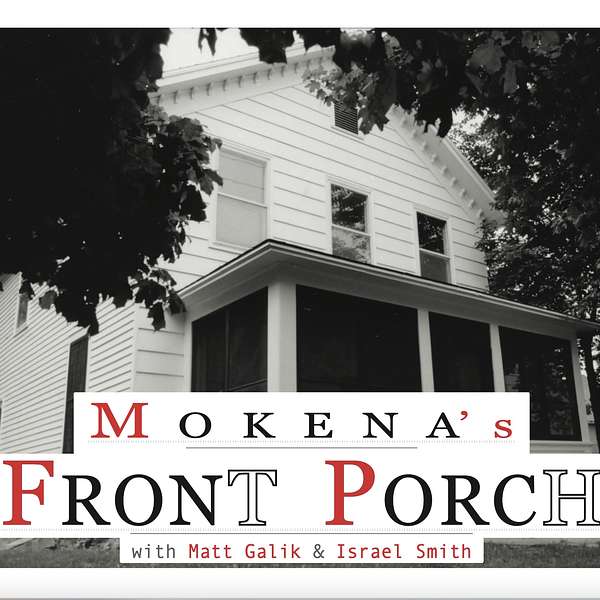
Mokena's Front Porch Podcast
Welcome to Mokena’s Front Porch – THE podcast for Mokena history and community!
Nestled in the heart of Chicagoland, Mokena began as a small farming community that flourished after the Rock Island train line arrived in 1852. Today, with a population of over 20,000, its rich past continues to shape its future.
Your hosts:
🔹 Matt – A lifelong Mokenian, local historian, and author of two books on Mokena history. His blog, Matt’s Old Mokena, serves as the foundation for many of our episodes, bringing forgotten stories of the village back to life.
🔹 Israel – A passionate storyteller who grew up hearing firsthand WWII accounts from his grandfathers. Since moving to Mokena in 2016, he has embraced its history, working through technical challenges as a first-time podcaster to bring this show to life. He’s a BIG fan of Mokena!
Join us as we explore the people, places, and moments that make Mokena special. Visit MokenasFrontPorch.com for more stories, updates, and ways to connect. You can also find us on social media!
Pull up a chair, get comfortable, and step back in time with us on Mokena’s Front Porch.
Mokena's Front Porch Podcast
Schmuhl School Open House - 1930's One Room School House
Diane Wilson, who is on the Board of the Historical Society, along with the dedicated volunteers, shared some great information and history of this old treasure! They share about the school's relocation and its current role as an educational time capsule. Through their efforts, children today can experience the charm and simplicity of a 1930s school. The Historical Society also teams up with the Will County Forest Preserve to combine nature hikes and field trips with historical learning.
We also talk about the work of the New Lenox Area Historical Society and their recent acquisition of the old Methodist Church, which is set to be a museum. I am so grateful for their time and for all that this group is doing to preserve the history of New Lenox.
This episode was the first episode that was made for video, so this is the audio only version of this episode. You can find a link to the YouTube Episode by Clicking HERE.
You can find the New Lenox Area Historical Society Website HERE!
Be sure to check out our website @ www.MokenasFrontPorch.com
Follow Us On Facebook At Mokena's Front Porch
Check Out Our YouTube Channel For Some Great Videos
Find Matt's Blog here: Matt's Old Mokena
Photo & Artwork Credit: Jennifer Medema & Leslie V. Moore Jr.
Do you have a question, comment or maybe an idea for an episode, you can email us at:
MokenasFrontPorch@gmail.com
Welcome to Mokena's Front Porch, a Mokena History Matt Galik with and me, Israel Smith. This episode is a little different and I want to start by saying thanks, mom. My mom was nice enough to see this event was coming up at the Schmuhl School in New Lenox and that school is right over by the Lincoln Way Central High School. So my mom was nice enough to see that on Facebook and sent it to me. And so last Saturday, october 14th, I went out to the open house and I really enjoyed what they're doing out there. The New Lenox Area Historical Society has a lot of great things going on. So I did something different. I recorded on with some video, so it was mainly a YouTube post video podcast first. We're also going to add the audio only here so you can listen as well, but I'd really encourage you to go on our YouTube page and watch the video.
Israel:Just really interesting. I put a lot of pictures in there. They were really nice to give me some booklets about the moving of the building, which, interestingly enough, it was moved from across Lincoln Highway, just across the street, to the other corner right by Lincoln Way Central. Well, a couple years ago they moved. I think they said it was six years ago, moved the downtown New Lenox train station five miles and they said it took about as long to move that as it did to move the school across the street. So there's a lot more that we got. This is about 20 minutes I recorded with them. Afterwards it took me down, showed me the basement even, which is really just their storage, but they've got an amazing collection of historical things from town. So it's a great property, a really interesting history. Again, it's the audio only. Check out the video on YouTube. Check out our brand new website at Mokenasfrontporch. com. You can also find both the YouTube and the link to this episode there as well.
Israel:Thanks for listening. Enjoy this audio from my tour of the open house of the Schmuhl School in New Lenox. Saturday, october 14th, today. And today the Schmuhl School in New Lenox, across from Lincoln Way Central, has an open house. So we're going to go check that out and I thought I'd bring you with. Hey Mokena, today is not the most beautiful day, but it's a great day for an open house at the Schmuhl School. So I came out to check this out and I thought it'd be interesting to share with you.
Israel:Behind me is the Schmuhl School and we're going to find a little bit more about that. I used to actually be across the street you can't see there, but across the street at the would be the northeast corner of Schmuhl House and Lincoln Highway in New Lenox, right by Lincoln Way Central. So we're going to check this school out. It has a connection to one of our episodes, the life of Private Carl Hacker, though this school was not there when he was living or when he had come here from Germany at the age of 17,. This is on the property and was previously on the property. That was where he first lived at his aunt and uncle's, the Schmuhl. So that's the connection here. Let's go inside and check it out. All right, I am at the Schmuhl School and can you just tell me your name, diane Wilson. All right, diane, and she's kind of enough to give me a little tour of the school here, so go ahead.
Diane Wilson:I'm just kind of give you a little history of the background. He started out working for the railroad but he really wanted to be a farmer. Well, there was 40 acres of land available for sale across the street from where we are now where the Walgreens Pharmacy is, and this was back in the 19, probably the late 1800s, early 1900s we don't know the exact dates. But he found this property and bought it and built his farm on that property.
Diane Wilson:At the time the state of Illinois was having some concerns about the children that were the farm children and their education. So they would go around and they asked a lot of the farmers in the area if they would donate some of their property to build one room schoolhouses on, and Henry Schmuel was definitely for that. So he, the original Schmuel school was a white frame building that was was first built and again, that was probably in the early 1900s, maybe the late 1800s, and it took on the name the one room schoolhouses generally took on the names of the farmers that owned the farmland. So they built up the school and then in 1930, the wooden frame building burned down. They think it was caused by the potbelly stove, kind of like what we have in the back there that maybe there were some embers left in it. Fortunately, there was nobody in the building when it happened and it burned to the ground.
Israel:And how was that in comparison to the size of this school building?
Diane Wilson:It was much smaller. It was a much smaller building. It was a white frame building, probably more like rugged wooden floors. If they were wooden at all, they could have been in dirt we don't really know. So it was for quite some time they didn't have a school. Well, it happened to be.
Diane Wilson:One of Henry Schmoll's relatives lived right down the street here, kind of where the Cooper's talk is now, and he owned some cabins and he offered the school children a place to have school and the cabins. They used one cabin for their classroom and another cabin for their lunchroom the only time Schmoll's school had a lunchroom. So the children went there. And then this building was opened up in 1932. It was considered extremely modern for a one-room school house. Electricity was beginning to come into the New Lenox area so it had electricity. It did not have running water at the time. You still had to go out and pump your water, the water pump. But it did have two bathrooms with chemical toilets in them. It had a basement and it would have the heat was. I think it was like a coal furnace down in the basement and then it was brick on the outside. So it was considered very modern for a one-room school house.
Israel:And do you know how many students were being taught?
Diane Wilson:It always varied, because I mean, there were some years when there were no first graders and there were maybe one or two, third, fourth, it varied depending on the number of children in the area.
Israel:Did it go through up to high school?
Diane Wilson:No, it just went through eighth grade, First grade, through eighth grade. Eventually, as New Lenox started to grow, they made it into a two-room school house. The first through fourth graders were upstairs and the fifth, sixth, seventh and eighth graders were down in the basement. Wow.
Israel:And when did they stop using the school?
Diane Wilson:It was back in. I think it was like in the 1990s. They stopped using it because New Lenox again was growing substantially and they were getting ready to open the Nelson campus on the south side of town. So they decided to sell Schmoll School at that time. Well, walgreens wanted the property but Walgreens did not want the school. So a little girl that had attended at one point in time this was a kindergarten center. It was ran as a kindergarten center and one of the little girls that went to school there was very concerned about it being torn down, because the same thing happened with our old brick tavern that was in town here many years ago. Over in the middle of the night poof it was gone. It was just people that owned it just didn't want it.
Israel:Any idea, what that young girl's name was?
Diane Wilson:Yes, Emily Corona.
Israel:OK.
Diane Wilson:Yeah, emily Corona was the little girl that came to the Historical Society wanting to know what can we do to save this school. Well, we put on spaghetti dinners, we sold t-shirts, we did all kinds of fundraising to earn the money because we wanted to get this school. We didn't want it demolished like our old brick tavern had been. So we were fortunate. Fortunately, we raised enough money. Walgreens didn't want the building, so it didn't really cost us much of anything to get the building. Our concern was moving it.
Diane Wilson:So we got a company out of the east that actually moved lighthouses and they came out here and it was in April of the year 2000. And we moved it. From that corner we were trying to figure out where could we put it? Where could we put it? And one of our members was saying you know, it would go perfectly over there in the Forest Preserve. This would be a perfect spot for it, but at that time the Forest Preserves were not allowing buildings on on the property. So at the time Renee Kozl was our state representative and she and one of our members are very good friends, and Renee went to the state and got it changed, being the fact that we are preserving history with the historical society and their preserving nature. It was a good mix. So we got it moved, got permission to move it and put it here on this property, and that was in April of the year 2000.
Israel:Is there, do you know of any video or anything of the moving of the school?
Diane Wilson:We do have. I'm not sure that we have much video, but we do have a booklet.
Israel:Yeah, oh, that had to be really interesting to see it was.
Diane Wilson:I mean, half of New Lenox was probably more than half of New Lenox was out here. I mean, it's an ordeal because you have to move power lines and everything too, but it took the whole day. And it's really interesting because since then we've moved another building the old train depot in New Lenox. We moved that in. Let's see what did we? This was our sixth anniversary of the move, the fifth, I think it's the sixth, the sixth anniversary of we did that in August of 2018 and we moved that out to the Kono farm. That was like a five mile trek to move that building. This was just across the street and it took us just about the same amount of time to get it moved from this one over here and the depot. But the technology has changed so much. It was all moving, the depot was all computerized. It was amazing, wow, amazing.
Israel:So now, what is this space used for?
Diane Wilson:Well, we open it. We have open houses here the second Saturday of each month, except for January, february, june and July, because of weather yes, because of weather. But we also have many field trips out here. Every single first grader in New Lenox gets to come here and spend the day and we reenact what school would have been like in the 1930s, and we have a couple of schools from Summit Hill that come out and enjoy it as well, so we reenact.
Diane Wilson:We have lesson plans, we do reading lessons. It's a school day, they're here for a school day and we have the toys that the children would have been playing with their recess games. Are you know, the Jacob's Ladders and pick up sticks and dominoes and jacks and marbles.
Israel:Wow.
Diane Wilson:So it's a lot of fun. And then, like I said, we have a good relationship with the Forest Preserve and we take nature hikes and we show the children some of the native plants that grow around here. We can talk a little bit about them as well.
Israel:And do you know of any relations to the Schmoules that are still in the area? Have you guys had any connections with anybody? You?
Diane Wilson:know what we it was. Actually it was Henry Schmoules granddaughter. We have a picture of her. We use the story Mary had a little lamb, because his granddaughter, marjorie had a little lamb named Izzy and Izzy would follow Marjorie to school. So but and Marjorie was very instrumental in helping us with the decorating of this building to get it to what it would mostly would have looked like during that time period. These are replicas of the lighting that would have been in here.
Israel:And is she still around?
Diane Wilson:No, we lost her about well, I think about four or five years ago. Okay, passed away.
Israel:Wow, and so she would have been the last that you knew of that that I'm aware of.
Diane Wilson:Yes.
Israel:Wow, very interesting. Anything else that you think is significant might be people find interesting.
Diane Wilson:Diane, you're here a lot with me. What am I missing Right when? Yes, it is, it is, it's. We have a. The flag that we have is a replica of a flag that would have flown in the classroom During that time period, because it only had the 48 stars on it. We had 48 states, so we talked to the children about that. We talked a lot about the flag. We talked about the pledge of allegiance to the flag too, because During the 1930s, the words under God were not a part of it. Oh sure, so that was when Eisenhower felt that it was important that we have those words, because people were coming here from different countries for the for religious reasons, so that they couldn't practice their religions the way they wanted to.
Israel:So and Did new Lennox also had a large German population. Yes, yes, yes which is the same with Mokena. Great. Well, this is really interesting. I'm not sure if there's anything else you like to share. You said every. Second Saturday of the month and it's open to the public 10 to 2 and how about the new Lennox historical Society?
Diane Wilson:we have our office is on 205 West Maple or Route 30 here in town, and but we have also recently Purchased the old Methodist Church that's on Church Street. Oh, and we're working on I'm transforming that into our museum.
Israel:Wow, so it's you have a very active we do, we do, we do, which is something I think we're kind of lacking.
Diane Wilson:Mokena unfortunately.
Israel:Yeah, great, well, I'm gonna walk around and you know check it out.
Diane Wilson:but I really appreciate if you have any questions, just let me know absolutely Thank you. Okay, I.
Israel:Just want to thank Diane Wilson, as well as the new Lennox historical Society volunteers. I'm sorry I forgot to write down the other Two people that were working there, but both very helpful. Everybody was really interesting. It was great, great experience. Make sure you check those out Every second Saturday of the month and they do the open house. So very interesting, great to see. It's amazing to me that that school was Running and being used until 1998 Pretty cool.
Israel:So I wanted to show you a couple of things. I got there. They sell ornaments as a fundraiser for the, for the historical Society, so I was able to pick up one here for Lincoln Way Central and it celebrated their 60th anniversary. So home of the Knights, and, yeah, there's 60th anniversary. So that was pretty cool. And then the other one I got was for the Schmool School, so they sold this one as well, showing 1922 to 1998 that school was being used. So really a dish, really interesting, cherished our Christmas memories. And new Lennox is what it says on the back, so If you go in you can buy those. I think they were $10 a piece. They had some t-shirts and things as well that helped support the, the New Lennox historical Society. So thank you all for doing that Really interesting. Make sure you go check it out.
Israel:Also, we have a new website at Mokena's front porchcom, so it's got some some of our YouTube videos. It's got some of our blog posts, our mats blog posts. We have a link to his site on there. We have our podcast episodes are available there, so check it out. Really interesting. We're gonna kind of grow that and add things as we go, but we thought it was a great ad and finally get a real comm website. So, other than that, just thank you guys for sharing the podcast. Spread the word. That's how this gets out. We're just really enjoying doing. This had our first year and we look forward to doing many more. So check out the website, check out our podcast, share with a friend, go look at what the New Lennox historical Society is doing and Check out the open house at school the Schmuhl school. I still do giggle a little bit whenever I say it, but it's good to know the background behind it. So thanks for listening. I hope you're enjoying the podcast in these episodes and we'll see you next time on Mokena's front porch.
Podcasts we love
Check out these other fine podcasts recommended by us, not an algorithm.

History That Doesn't Suck
Prof. Greg Jackson
South Side Pod
The Broadcast Basement
Dan Carlin's Hardcore History
Dan Carlin
The Economics of Everyday Things
Freakonomics Network & Zachary Crockett
Founders
David Senra
This American Life
This American Life
American History Tellers
Wondery
Chicago History Podcast
Chicago History Podcast
